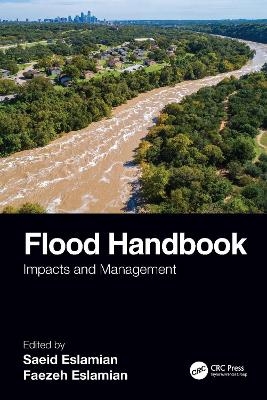
Flood Handbook
CRC Press (Verlag)
978-1-138-61514-4 (ISBN)
Floods are difficult to prevent but can be managed in order to reduce their environmental, social, cultural, and economic impacts. Flooding poses a serious threat to life and property, and therefore it’s very important that flood risks be taken into account during any planning process. This handbook presents different aspects of flooding in the context of a changing climate and across various geographical locations. Written by experts from around the world, it examines flooding in various climates and landscapes, taking into account environmental, ecological, hydrological, and geomorphic factors, and considers urban, agriculture, rangeland, forest, coastal, and desert areas.
Features
Presents the main principles and applications of the science of floods, including engineering and technology, natural science, as well as sociological implications.
Examines flooding in various climates and diverse landscapes, taking into account environmental, ecological, hydrological, and geomorphic factors.
Considers floods in urban, agriculture, rangeland, forest, coastal, and desert areas
Covers flood control structures as well as preparedness and response methods.
Written in a global context, by contributors from around the world.
Dr. Saeid Eslamian is professor of Hydrology at Isfahan University of Technology, where he heads the Hydrology Research Group in the Department of Water Engineering. His research focuses mainly on statistical and environmental hydrology and climate change. In particular, he is working on modeling and prediction of natural hazards including flood, drought, storms, wind, groundwater drawdown, and pollution for arid and semi-arid zones, particularly in urban areas. He is also a Visiting Professor at Princeton University, and University of ETH Zurich, Switzerland. He has contributed to more than 300 publications in books, research journals, and technical reports or papers in conferences. He is the Founder and Editor-in-Chief of both the International Journal of Hydrology Science and Technology and the Journal of Flood Engineering. He received ASCE and EWRI awards in 2009 and 2010 for his research. Faezeh A. Eslamian is a PhD candidate of bioresource engineering and research assistant at McGill University, Montreal, Quebec, Canada. She is currently working on the fate and transport of phosphorus through subsurface drained farmlands. Dr. Eslamian completed her bachelor’s and master’s degrees in civil and environmental engineering from Isfahan University of Technology, Iran, where she evaluated natural and low-cost absorbents for the removal of pollutants such as textile dyes and heavy metals. Furthermore, she has conducted research on the worldwide water quality standards, wastewater reuse, and drought guidelines.
Part I: Flood and Sustainability
Sustainability in Flood Management-Fernando Alcoforado
Hydrological Resilience of Large Lakes Management-Mike Ahmadi
Best Management Practices as an Alternative for Food Control
Part II: Flood Impact Analysis
Flood Management: Status, Causes and Impact of Land Use on Flood in Brahmaputra
Impact of Urbanization on Flooding
Impact of Infiltration on Volume and Peak of Flood-Saeid Eslamian
Impact of Bed Form on River Flow Resistance-Saeid Okhravi
Catchment Morphometric Characteristics Impact on Floods Management: Role of Geospatial Technology
Part III: Flood Risk Management
Floods: From Risk to Opportunity-Iftekhar Ahmed
Flood Risk Management in Romania- Daniel Diaconu
Importance of Risk Mapping in the Processes of Spatial Planning in Spain-Jorge Olcina Cantos
Reducing Flood Risk in Spain: The Role of Spatial planning, Alvaro-Francisco Morote Seguido
Integrated Coastal Flood Risk Analysis-Andreas Burzel-Andreas.Burzel@deltares.nl-Dilani Dassanayake
River Rehabilitation For Flood Protection-Tomasz Walczykiewicz
Torrential and Flash Flood Warning: General Overview and Uses of Localized Hydropower-Spyros Schismenos
Part IV: Flood Hazard and Damages
Flood and Building Damages-Mousa Maleki
Flood Mapping, Monitoring and Damage Assessment using Geospatial Technology-Vaibhav Garg
Fundamental Issues of Flood Hazard In the Alluvial Fan Environment-Jonathan Fuller
Physical Vulnerability, Flood Damage, and Adjustments Examining the Factors affecting damage to Residential Buildings in Eastern
Dhaka-Md Nawrose Fatemi
Part V: Flood Erosion and Sediment
River Flood Erosion and Land Development and Management-Giovanni Barrocu
Debris and Solid Waste in Flood Plain Management-Sama Al-Jubouri
A Sedimentary Investigation into Origin and Composition of a Dam Reservoir-Hallouz Faiza
Sedimentation and Geomorphological Changes during Floods: Selected Problems-Leszek Starkel
Part VI: Flooding and Dam Construction
Dam Failure Assessment for Sustainable Flood Retention Basins-MIklas Scholz
Simulating Flood due to Dam Break-Zafer Bozkuş
Modelling the Propagation of the Submersion wave in Case of a Dam Break-Bouhellala Kharfia
River Restoration as Flood Impact Mitigation-Osvaldo Rezende
| Erscheinungsdatum | 07.12.2020 |
|---|---|
| Zusatzinfo | 71 Tables, black and white; 196 Line drawings, black and white; 41 Halftones, black and white; 237 Illustrations, black and white |
| Verlagsort | London |
| Sprache | englisch |
| Maße | 178 x 254 mm |
| Gewicht | 1152 g |
| Themenwelt | Naturwissenschaften ► Geowissenschaften ► Geologie |
| Naturwissenschaften ► Geowissenschaften ► Geophysik | |
| Naturwissenschaften ► Geowissenschaften ► Hydrologie / Ozeanografie | |
| Technik ► Umwelttechnik / Biotechnologie | |
| ISBN-10 | 1-138-61514-5 / 1138615145 |
| ISBN-13 | 978-1-138-61514-4 / 9781138615144 |
| Zustand | Neuware |
| Informationen gemäß Produktsicherheitsverordnung (GPSR) | |
| Haben Sie eine Frage zum Produkt? |
aus dem Bereich


